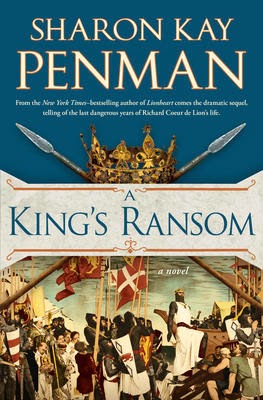Penman’s epic novels about the lives of English royalty are much beloved by many—and with good reason. Penman’s most recent novel completes her cycle about Richard the Lionhearted, including both Lionheart and A King’s Ransom. Penman’s novels engage in a kind of alchemy that’s worth analyzing in a review because you won’t be aware of it while you’re in the midst of reading. That’s the point—she’s so good at it you won’t notice what she’s doing—you’ll be caught in the story. She does three things as a writer that ought to make the reader draw back or slow down, and yet, they don’t. In the hands of a less skillful writer these stylistic choices would, but the magic here works. Hence my claim that Penman is a kind of literary alchemist, turning the ordinary or even disastrous in most writers’ hands into something transformed and transforming.
So what are the three things? One is the length of her books. They are big. Don’t try to hold on with one hand while balancing A King’s Ransom over your cup of tea. You will drop the book. I’ll grant there are other historical writers who draw their readers through 650 pages without slowing down, but it is a relatively rare talent.
The second aspect of Penman’s style that should set off warning bells, but does not, is the amount of historical information she includes. You’ll get the complete story of Richard the Lionheart and you’ll enter into precise details of warfare, daily life, international political intrigue, personalities of all relevant persons both famous and less so, clothing, armor—pretty much everything. She even follows thru on historical tangents that are important but not central to the main tale. Writing historical fiction well is usually all about balance—including enough period detail to persuade your reader they are there, but not too much. I’ve never felt while reading Penman’s books that there was too much. But when I step back and break the spell she’s cast, it looks suspiciously like a lot of history. How does she get so much in without weighing down the tale? I wish I knew. It’s her special alchemy.

- Sharon Kay Penman, Literary Alchemist
The third bit of alchemy is the most impressive to me. Her epic arcs of history require contributions from a wide range of narrators. The ordinary writer with many shifting points of view will be told the novel suffers from confusing “head-hopping.” Somehow Penman can glide her reader from one character’s viewpoint to another without any hitches even within one scene. When I read Penman’s first novel The Sunne in Splendour, I remember being forced to put it down in order to cook dinner. I was stirring something when it dawned on me, as my thinking shifted from reader to writer/analytical mode, that I couldn’t identify who was telling the novel. I grabbed the book and scanned the scenes I’d read. When I realized what she’d accomplished, I was awestruck—seamless shifts without any awareness on the reader’s part, with no sense of disorientation. It’s a style perfectly suited to her grand subject matter. We can delve into history through multiple minds and perspectives. Each feels intimate. Each persuades. I never wonder whose head I’m in; I always know. I honestly have no idea how she does it. As the warning in ads says, “Don’t try this at home.” Unless you’re an alchemist.
Buy A King's Ransom at:
The Poisoned Pen
The Poisoned Pen

